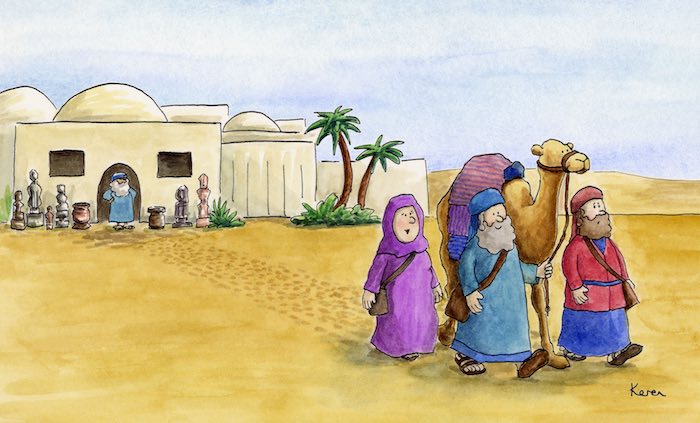There are some experiences in life that are so extreme that they test us to the very core of who we are. I’m not a typical extreme sport person, but while living in the country of Turkey I had the opportunity to climb Mt. Ararat and didn’t want to let that opportunity pass me by. I signed up for the climb and joined the team at the end of July, 2002.
We spent one week getting acclimated in mountains that were 3000-4000 meters (10,000-13,000 ft) in elevation near the Black Sea coast and then traveled to the city of Doğubeyazıt in the east of Turkey, near the Iranian border. We spent one night in a hotel in Doğubeyazıt and then made our way to the largest mountain of Ararat, Mt. Ararat, the following morning. We spent two days climbing Mt. Ararat and camped each night on the mountain until the third day when we woke up at 3 am to summit the mountain.
The final night before we summited the mountain we camped at an elevation of about 3700 meters (12,000 ft). Mt. Ararat has an elevation of 5,137 meters (16,854 ft). I thought that I was up for the challenge to climb to the summit of the mountain but I really didn’t understand the test which lay before me at that time.

Mt. Ararat is snow-capped year round. We were climbing the mountain during the first week of August. It was 40 degrees celsius (105 F) at the bottom of the mountain and some unknown temperature below zero at the top. It was freezing cold. The challenge in climbing Mt. Ararat isn’t so much the freezing conditions as one approaches the peak, as the lack of oxygen when one arrives within a few hundred meters of the top. The air gets thinner and it becomes difficult to breath.
During the last 200 meters of ascent, I was taking a rest after every 10-15 steps. The conditions were freezing, I could hardly breath, and it was taking every ounce of energy that I had in order to focus and climb the mountain. At one point I decided to quit and go back down the mountain but our mountain guide talked with me and encouraged me to keep going. We eventually made it to the top and we were all jubilant at our accomplishment.
The climb to the top of Mt. Ararat tested my physical capabilities to an extreme that I had never experienced before or since. We never know how much we can accomplish or how much we can endure until we face certain tests in life. It is easy for someone to say, “I’m going to climb Mt. Ararat” but it is quite a different story to actually climb it. It is similar in one’s spiritual walk with God. It is easy for someone to say that he or she believes in God, but it can be a very different story when a person is tested in his or her faith. This week’s Torah Portion contains an example of an extreme spiritual test.
Watch a brief video summary of this week’s Torah Portion commentary:
The Binding of Isaac
This week’s Torah Portion contains one of the most powerful stories recorded in the Bible; “The Offering of Isaac” or as it is called in Hebrew, “עקדה” – “akeidah” – “The Binding” i.e. of Isaac. The account of Abraham being commanded by God to offer up his own son as a sacrifice is difficult for any of us to understand, however, we know from the outset that God was using this event to test Abraham:
Now it came about after these things, that God tested Abraham, and said to him, “Abraham!” And he said, “Here I am.” – Gen. 22:1
God called and Abraham responded with a ready answer, however, he had no idea what God was about to ask him to do.
God continued to instruct Abraham regarding a journey that he was to set out on in order to offer up his son as a burnt offering to God, however, God did not provide a reason why:
He said, “Take now your son, your only son, whom you love, Isaac, and go to the land of Moriah, and offer him there as a burnt offering on one of the mountains of which I will tell you.” – Gen. 22:2
The LORD clearly instructed Abraham about two things; he was to take his son Isaac along with him to the Land of Moriah and he was to offer up Isaac as a burnt offering on a mountain which the LORD would show him. There are many difficult events recorded in the Bible and this has to be among the most difficult to comprehend.
One would think that God’s request was so absurd that Abraham wouldn’t have even considered it, however on the contrary, Abraham didn’t even question God:
So Abraham rose early in the morning and saddled his donkey, and took two of his young men with him and Isaac his son; and he split wood for the burnt offering, and arose and went to the place of which God had told him. – Gen. 22:3
The obedience of Abraham is stunning. Who could ever even consider offering his own child as a sacrifice? What was Abraham thinking during the journey to Moriah? We would all like to be privy to Abraham’s diary on that three-day journey from Beer Sheva to Mt. Moriah.
“Lech” “Le’cha” – “לך לך”
As I studied the account of “The Binding” of Isaac this week, I noticed that the LORD spoke to Abraham in a similar manner as to how He spoke to him earlier in his life. When God commanded Abraham to take his son, his only son, the son whom he loves, Isaac and go to the land of Moriah, He used the familiar phrase “לך לך” – “lech le’cha,” which is literally translated, “go you” or “go for yourself” but is generally translated as a command, “Go” with the “you” being understood.
The command of God to Abraham to “Go!” – “לך לך” – “lech le’cha,” regarding taking Isaac to the land of Moriah was the exact same command that God first gave to Abraham in Haran at least 30-40 years earlier (Gen. 12:1). In fact, the phrase “לך לך” – “lech le’cha” contains the very first words recorded in the Bible that God spoke to Abraham:
Now the LORD said to Abram, “Go forth from your country, and from your relatives and from your father’s house, to the land which I will show you; – Gen. 12:1
God commanded Abraham to “Go forth” – “לך לך” – “lech le’cha” and Abraham obeyed God and left his father and his father’s family in Haran.

Abraham lived as a stranger in a foreign land. A generation had now passed and Abraham was hearing these words again with a similar call to go to another land but this time with a purpose which surely baffled him throughout that entire three-day journey.
The words “לך לך” – “lech le’cha” were no doubt “ringing in the ears” of Abraham for all of those years since he had left his father in Haran. When he heard these words a second time from the mouth of God, he must have thought, “I wonder what God is up to now?” Most of us are very familiar with the story of Abraham and Isaac and everything that transpired on Mt. Moriah. To read a more thorough study of “The Binding” of Isaac, I recommend the previous year’s commentary: Separation from the Father
Abraham had two “לך לך” – “lech le’cha” moments in his life, the first time at the age of 75 when God first spoke to him and the second time in this scenario with Isaac on Mt. Moriah, which was 35-40 years later. In a general sense, Abraham’s faith is bookended by these two calls from God for him to “Go!” The phrase “לך לך” – “lech le’cha” is only used twice in the Hebrew Scriptures and both times it corresponds to these two accounts when God spoke to Abraham. What do we learn from Abraham’s “לך לך” – “lech le’cha” moments in life?
Lessons from “לך לך” – “Lech Le’cha”
In the account of Abraham being tested by God to offer up his son Isaac as a burnt offering we are told specifically at the end of the story why God tested him and how God understood this:
But the angel of the LORD called to him from heaven and said, “Abraham, Abraham!” And he said, “Here I am.” He said, “Do not stretch out your hand against the lad, and do nothing to him; for now I know that you fear God, since you have not withheld your son, your only son, from Me.” – Gen. 22:11-12
Abraham had showed God that he was willing to put God first in his life, even above the most precious gift that he had received, the promised son through his wife Sarah. Abraham feared God, Abraham obeyed God, and Abraham pleased God with his life.

The Cost of Obedience
I believe that we truly have a great example in Abraham’s life of a man who obeyed God whenever God spoke to him. God spoke to Abraham at various times along his journey and Abraham always obeyed, no matter what the cost. We especially see the obedience of Abraham to the word of God on the two occasions that God told him to “Go!” Obedience to God is costly and Abraham understood that cost as he followed God wherever He would lead him.
I can personally testify that obeying the call of God to “go” is costly and is filled with trials and temptations. God has spoken to me twice in my journey of life to go to a new land; the first time to Turkey and the second time to Israel. Each time I was called to leave my former homeland behind, including family and friends. Each time I was forced to make my way in a new land which has included learning a new language, establishing a home, learning local culture, getting along with the local people, and establishing new friends and community. Obeying God has a price. I’ve experienced a bit of the cost of obeying God and many of you have as well.
Whatever God calls us to do and wherever God calls us to go, we must be willing to obey the voice of God. God is not going to call every one of His children to leave their homeland. God speaks to each of us in different ways and calls each of us to accomplish different objectives. The important thing is to obey God when He calls, no matter what the cost. What is God calling you to do with your life? Do you have ears to hear the LORD’s voice today? Are you willing to follow God wherever He may lead you?
Confirmation of our Faith
A second thing that we learn from the life of Abraham is that our obedience to God’s call on our lives is a confirmation of the faith that we profess. The Scriptures clearly teach us that faith and works must go hand in hand:
What use is it, my brethren, if someone says he has faith but he has no works? Can that faith save him? If a brother or sister is without clothing and in need of daily food, and one of you says to them, “Go in peace, be warmed and be filled,” and yet you do not give them what is necessary for their body, what use is that? Even so faith, if it has no works, is dead, being by itself. – James 2:14-17
Our faith in God must be accompanied by our actions on a daily basis. As illustrated here in the book of James, our faith must be displayed in our daily actions not simply defined by religious jargon.
Faith Without Works is Dead
In this same context of the subject of faith and works being foundational to our walk with God in the book of James, we read about the example of the life of Abraham and how his works perfected his faith:
But are you willing to recognize, you foolish fellow, that faith without works is useless? Was not Abraham our father justified by works when he offered up Isaac his son on the altar? You see that faith was working with his works, and as a result of the works, faith was perfected; and the Scripture was fulfilled which says, “And Abraham believed God, and it was reckoned to him as righteousness,” and he was called the friend of God. You see that a man is justified by works and not by faith alone. – James 2:20-24
Through Abraham’s obedience to God he demonstrated his faith. Abraham didn’t just say he believed, he acted when God spoke to Him.
Anyone who believes in God and confesses faith in Yeshua as the Messiah has a responsibility to live out the teachings of the Bible in one’s daily life. Our faith will motivate us to act in accordance with loving God and loving our neighbor. If our faith and our actions are not consistent, we must question the foundation of our faith. The faith that we profess compels us to act in accordance to the God in whom we believe. Faith without works is dead!

The Testing of Our Faith
As we follow in the footsteps of Abraham and live a life of active faith we are sure to face testing and trials along the way, just as Abraham did. We cannot choose how we will be tested but we can choose our response:
Consider it all joy, my brethren, when you encounter various trials, knowing that the testing of your faith produces endurance. And let endurance have its perfect result, so that you may be perfect and complete, lacking in nothing. – James 1:2-4
The key to success in our life of faith is to be obedient to the Word and Voice of God and to allow the trials of life to perfect us. Abraham illustrated these verses by being perfected through his times of testing. To be true sons and daughters of Abraham, we must show our faith through our actions when the times of testing come.
Shabbat Shalom!
If you enjoyed reading this article, share it today with friends! We also invite you to sign up for our weekly Torah Portion commentary on the sidebar to the right.
Help keep our weekly commentaries free and available to all. Click here to donate today:
Torah Portion: Gen. 18:1 – Gen. 22:24
Haftara: 2 Kings 4:1-37
Return to Torah Portion Homepage
Copyright Jewels of Judaism. All rights reserved 2016



Thanks for pointing out the significance of the phrase “לך לך”. It actually links two stages of Abraham’s faith. Thinking what has happened between these two “לך לך” giving me some insights and encouragements for my own journey of faith. Sometime we need to act, but sometime we need to wait. All these are showing our trust in God. So when He wants us to wait, don’t give up on waiting; when He wants us to act, don’t be afraid to take the action. And I think I’m learning this lesson. Hope that I have open ears and humble heart to do whatever the Lord wants me to do.
I appreciate your feedback Nancy. I was encouraged in a similar way as I studied these Scriptures. It’s good to keep in mind God’s sovereign hand along the journey of life.
Shabbat Shalom!
Daniel
Good reminder: “Consider it all joy, my brethren, when you encounter various trials, knowing that the testing of your faith produces endurance. And let endurance have its perfect result, so that you may be perfect and complete, lacking in nothing.”
It´s a well-known story about Abraham but thinking of some circumstances and it is very encouraging to me! Thank you Daniel!
Shabbat Shalom!
You’re welcome Yazmin. I appreciate your comments.
Shabbat Shalom!
Daniel